Content
- Contributions of the IAI at COP16
- STeP Fellows explore new science diplomacy strategies with regional experts
- Governments Must Prioritize the Health-Biodiversity Interlinkages
- Brazilian Project Bridges Science and Policy for Environmental Solutions
- Road to Belém: science and health at the center of climate action
IAI Newsletter 4/24
Contributions of the IAI at COP16: Science and diplomacy for biodiversity conservation
The meeting of the Conference of the Parties to the Convention on Biological Diversity (COP16), held in Cali, Colombia, brought together governments, scientists and international organizations to discuss possible solutions to the challenges of global biodiversity. The objective of COP16 was to establish commitments and strategies to meet the Kunming-Montreal Global Biodiversity Framework, through immediate action, sustainable financing and intersectoral collaboration.
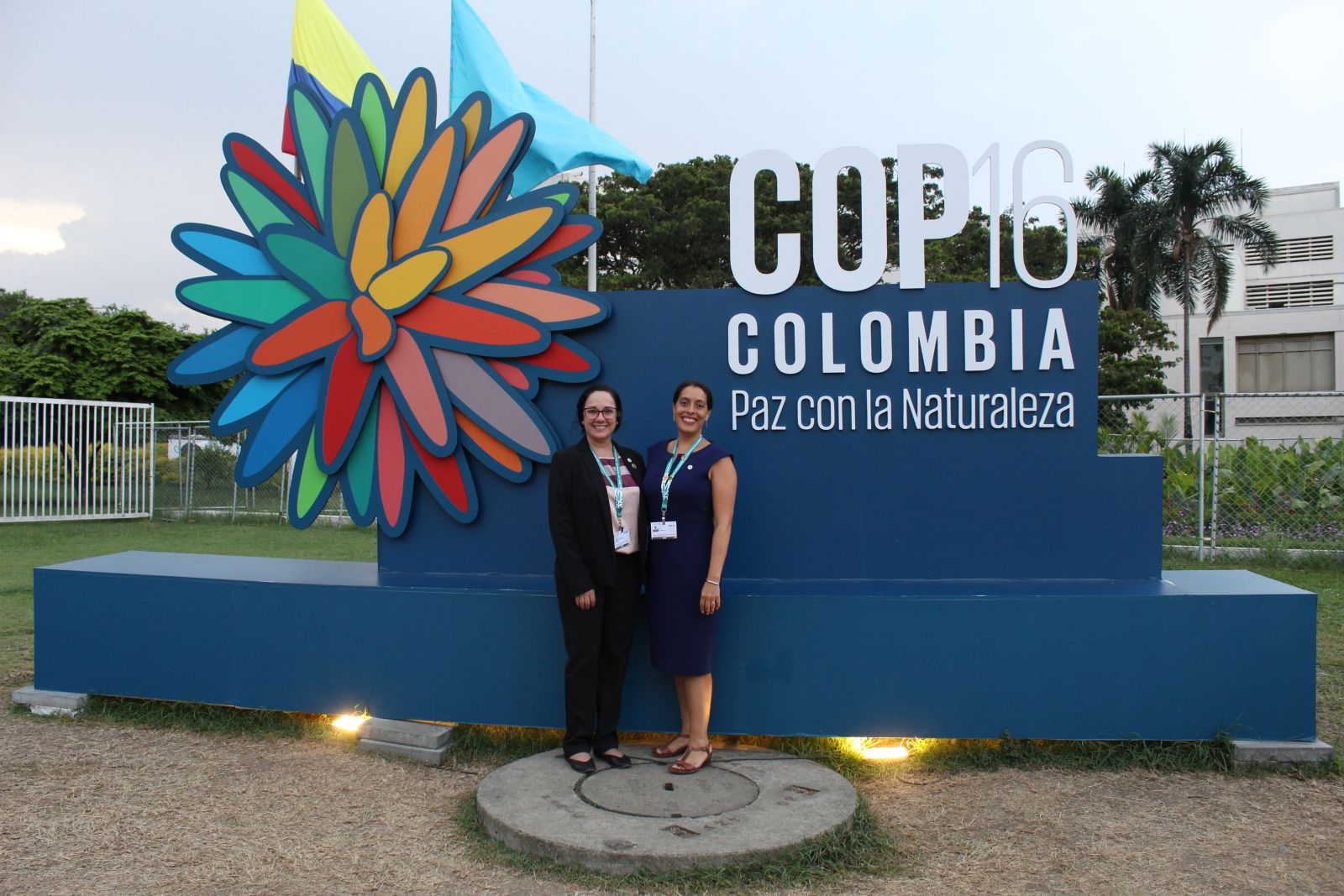 | 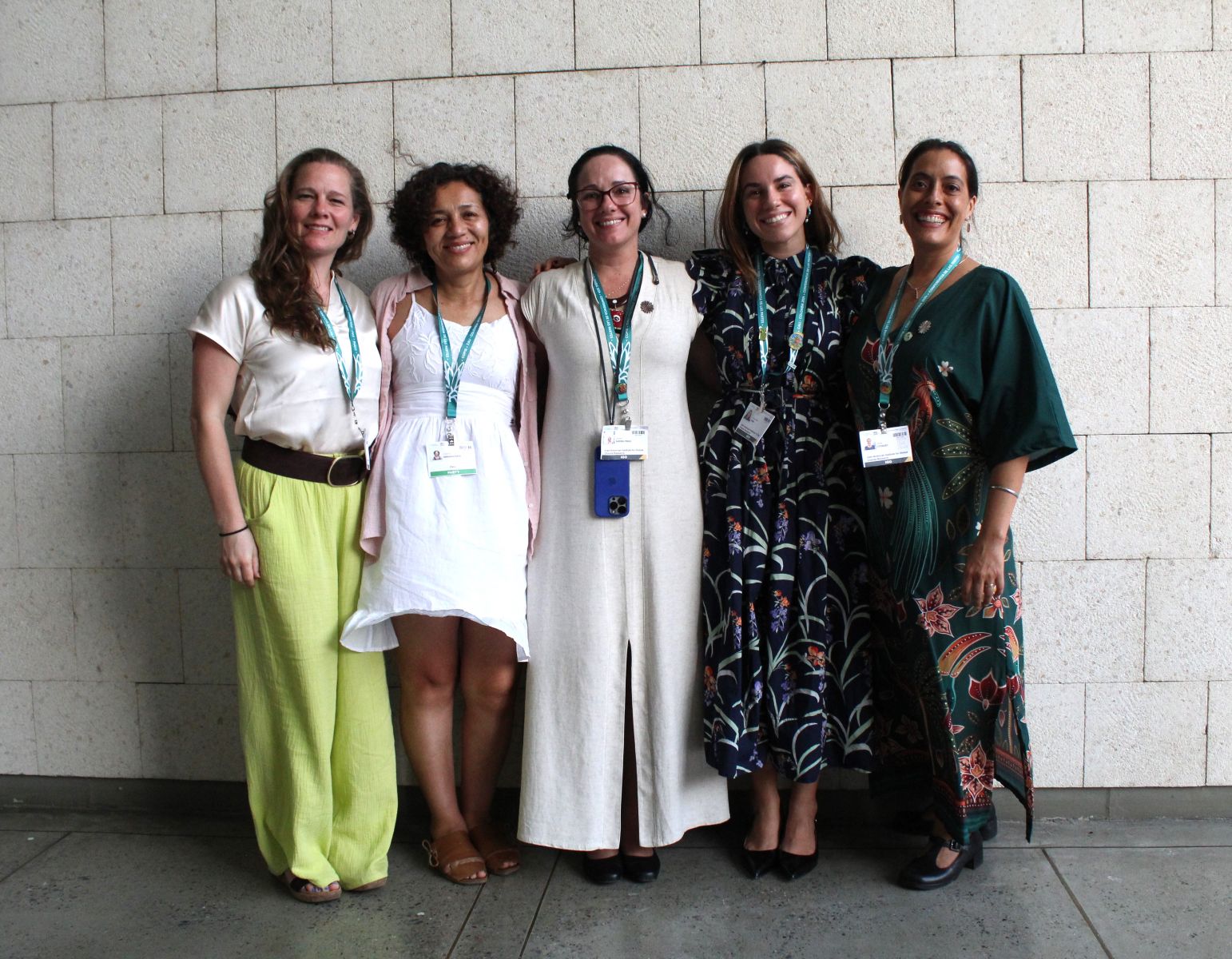 |
As official observers of the Convention on Biological Diversity (CBD), the IAI Executive Directorate sent a delegation to participate in high-level ministerial meetings and other gatherings focused on policies and actions on environmental and climate challenges, both regionally and globally, highlighting the interface between science and policy.
The IAI Executive Directorate delegation attended a number of strategic sessions during the conference, including:
- 19 October: Training and Development Forum.
- 21 October: Scientific Diplomacy at the Nexus of the Oceans, One Health and Climate Change in Latin America; Biodiversity and Productive Development: Reviewing the Economic Panorama in Latin America and the Caribbean.
- 25 October: Reflections from the Global South for Planetary Change; Colombia Megadiversa: Biocultural Laboratory for Global Climate Action; Scientific Diplomacy for Decision-Making in Biodiversity and Climate Change.
- 27 October: National Biodiversity Strategies and Action Plans (EAPANB) – Integrating Science and Data for Effective EAPANB and Community Participation (Goals 20 and 21).
- 28 October: Ministerial Conference on Plastic Pollution, including Marine Litter; Women in Science: Exploring the Link between Gender, Well-being and Nature Conservation.
- 30 October: High-Level Ministerial Dialogue on “Synergies between Biodiversity and Climate Change: from Science to Action”; Scientific Diplomacy at the Nexus of Biodiversity, Climate Change and Health in the Americas.
- 31 October: Scientific Diplomacy for the Integration of Nature and Culture: Policies and Practices.
Women in science: Exploring the link between gender, wellbeing and nature conservation
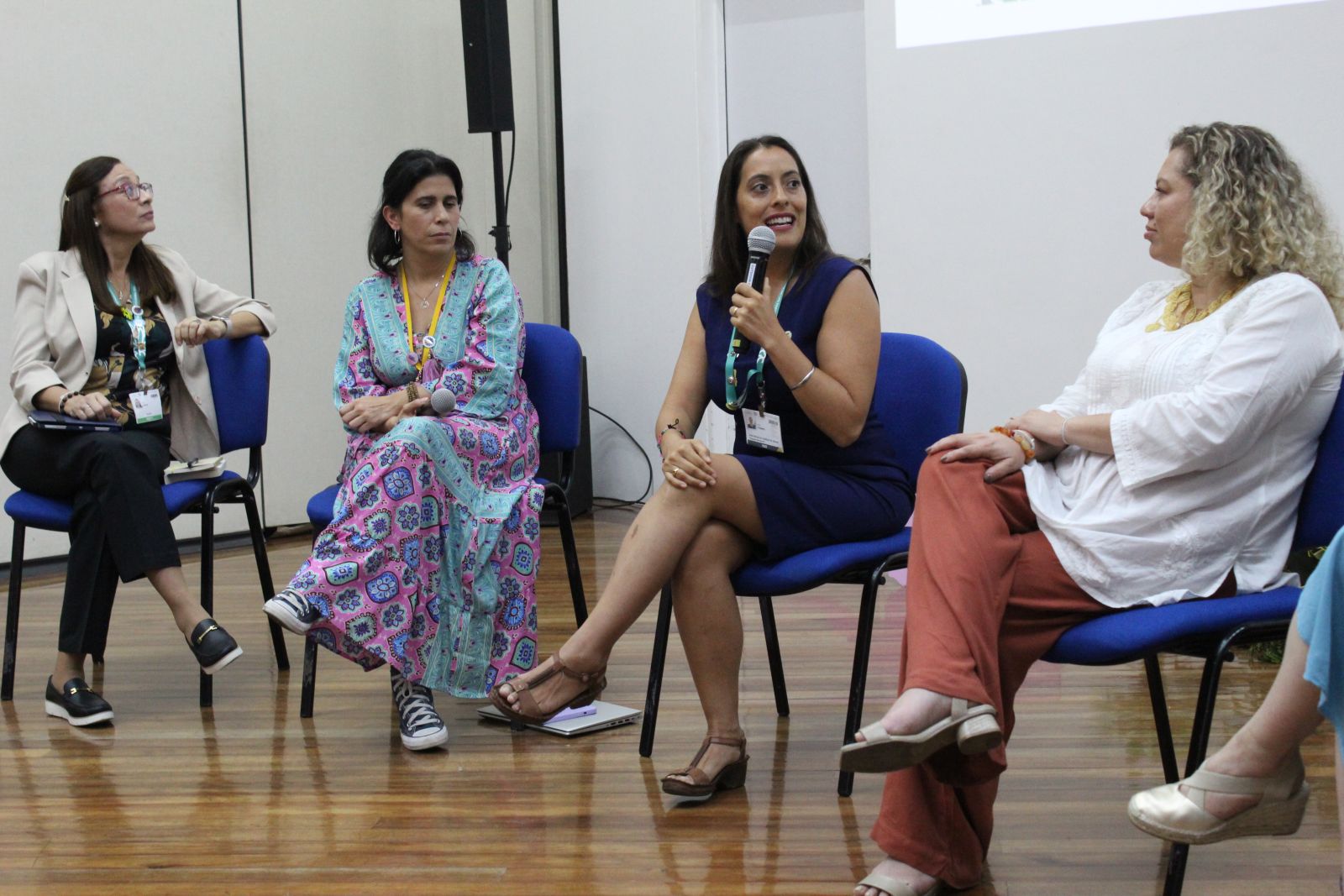 |  |
Anna Stewart Ibarra, Executive Director of the IAI, participated in the dialogue “Women in Science: Exploring the Link between Gender, Well-being and Nature Conservation,” alongside prominent figures such as Oris Sanjur from the Smithsonian Tropical Research Institute (STRI), Panama, Sandra Vilardy from the University of Los Andes (Colombia), and representatives from the Humboldt Institute (Colombia), discussing the importance of inclusive approaches in conservation. This dialogue highlighted how biodiversity conservation policies can benefit from gender perspectives, strengthening decision-making with an equitable representation of female voices.
Scientific diplomacy at the nexus of biodiversity, climate change and health in the Americas
At this event, the IAI promoted scientific diplomacy as a fundamental tool to safeguard biodiversity in Latin America and the Caribbean. Larisse Faroni, IAI STeP Fellow, and experts in protected areas and climate change from various institutions participated in the session. This space allowed for the exchange of experiences on how to promote climate resilience through integrated strategies, prioritizing social inclusion and scientific collaboration in the region to face environmental challenges.
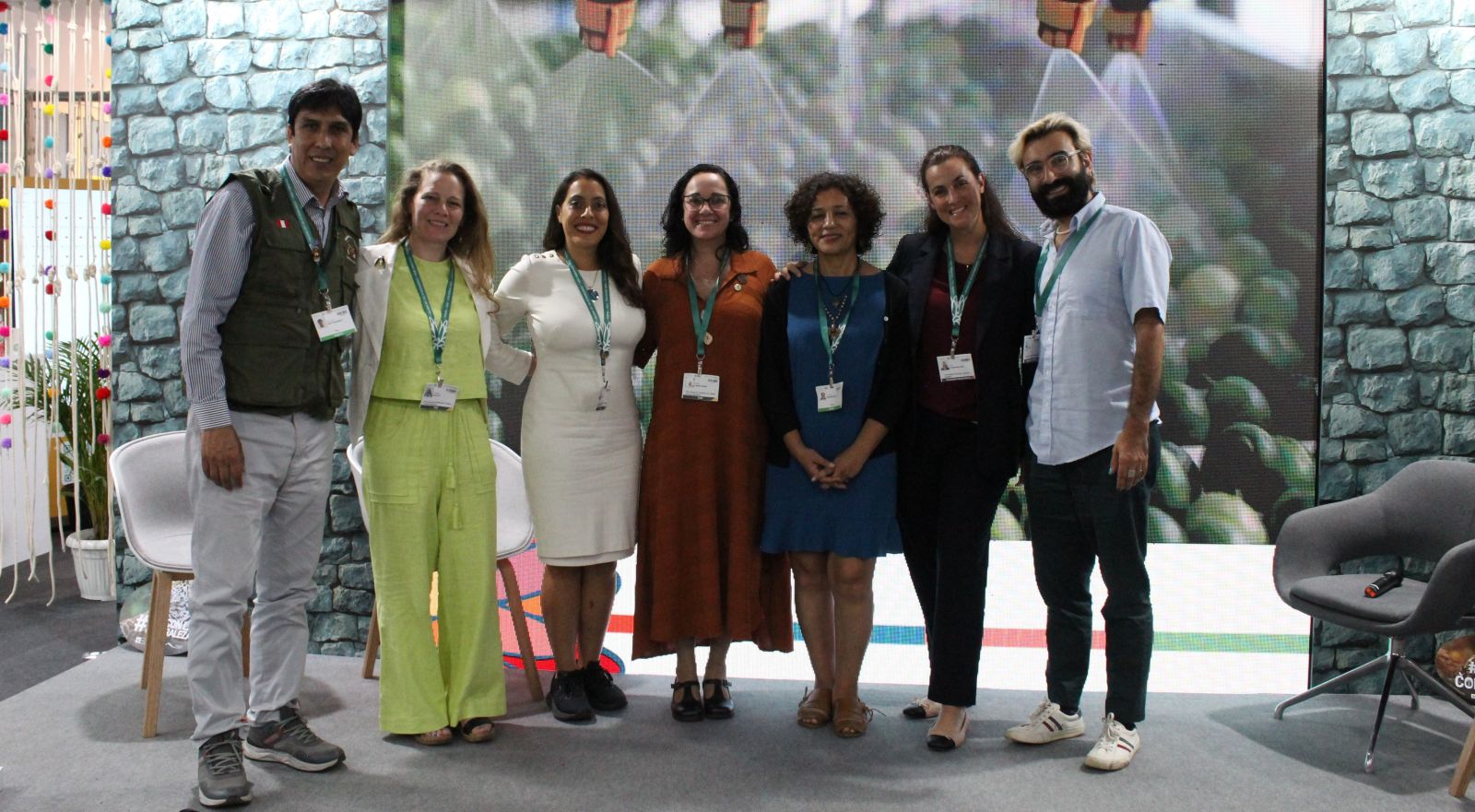
Anna Stewart Ibarra, Executive Director of IAI, and Larisse Faroni-Perez, Fellow of the STeP program, also participated in the event: “Scientific diplomacy for the integration of nature and culture” and highlighted the need to build bridges between scientific knowledge and decision-makers, promoting an integrative approach that values both local knowledge and advanced science for the protection of ecosystems and the well-being of communities.
 |  |
High-level ministerial dialogues
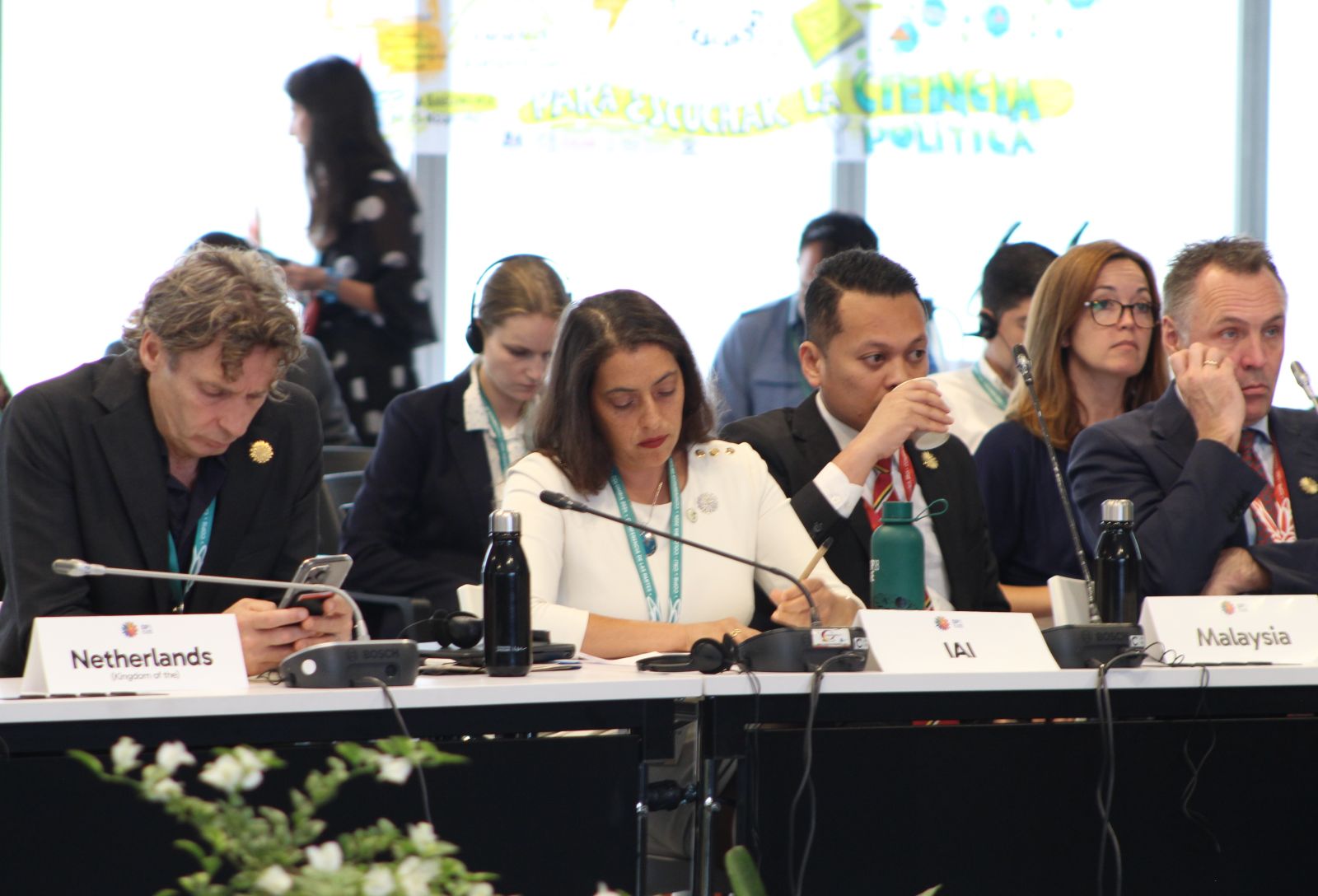 | 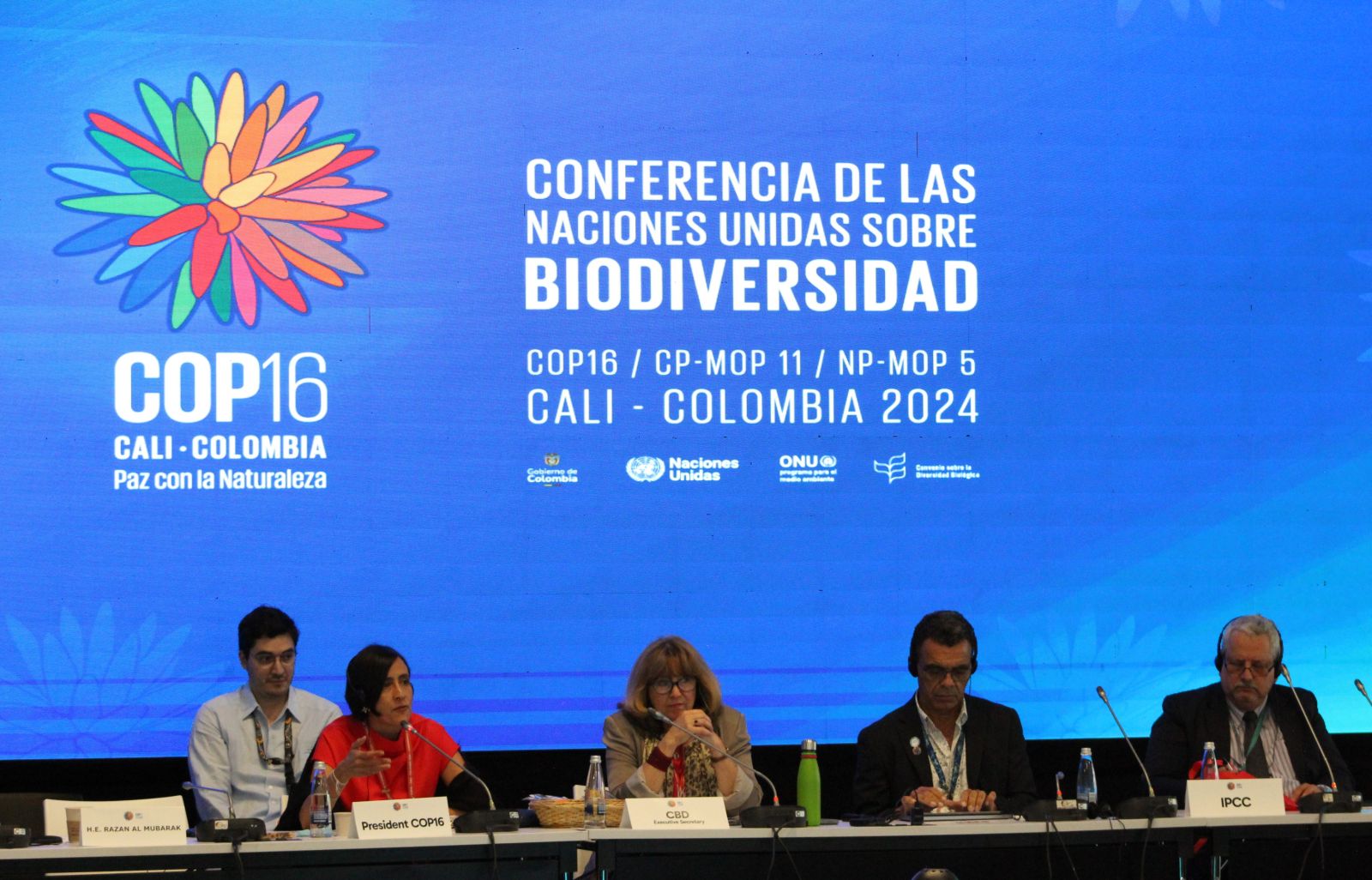 |
As part of the ministerial dialogues organized by the Government of Colombia, IAI participated in discussions on key COP16 themes, including “Urgent Action for the Implementation of the Kunming-Montreal Global Biodiversity Framework” and “Synergies between Biodiversity and Climate Change.” These dialogues brought together ministers and high-level representatives to address the relationship between biodiversity and sustainable financing, as well as peace with nature.
The roundtable format allowed for an interactive exchange of ideas and visions among the leaders present, aligning with the COP16 objectives of integrating science and action in favor of the environment.
During her intervention, Anna Stewart Ibarra, Executive Director of IAI, highlighted three key areas for implementing the global biodiversity plan, especially at the intersection between climate and biodiversity:
- Transform science towards an equitable and solution-oriented approach, promoting collaboration between sectors to overcome academic barriers.
- Increase funding for science in Latin America and the Caribbean, where scientific investment is among the lowest in the world in proportion to GDP. She highlighted the role of the Belmont Forum in funding applied science relevant to the Convention on Biological Diversity, as well as current and future calls for projects in tropical forests and oceans.
- Create channels to integrate science into government decision-making, increasing capacity in this area. She highlighted the IAI STeP fellows program, with more than 90 young scientists trained in scientific advice in government agencies in the region, and announced a new cohort of fellows in Brazil focused on bioeconomy, in collaboration with FAPESC and the Brazilian Ministry of Science and Technology.
The participation of a delegation from the IAI Executive Directorate in these events reflects its commitment to strengthening scientific diplomacy and promoting inclusive and sustainable policies in the region. Through these spaces, the IAI continues to promote an agenda that links science, conservation and resilience to climate change, reinforcing its leadership in the field of environmental cooperation in the Americas.
IAI Newsletter 4/24
STeP Fellows explore new science diplomacy strategies with regional experts
From November 8 to 10, 2024, the workshop Science Diplomacy & Innovation for Global Environmental Change in the Americas took place in Washington, D.C., United States. Organized by the Science Diplomacy Center of the Inter-American Institute for Global Change Research (IAI), in collaboration with the United States Global Change Research Program (USGCRP), the National Academies of Sciences, Engineering, and Medicine (NASEM), the Center for International Negotiation (Caeni-USP), and the Science Diplomacy and Innovation School at the University of São Paulo (InnSciD-USP), the event brought together experts and professionals from across the region to explore the intersections of science, innovation, and diplomacy in the context of global environmental change.

In the photo: Marcella Ohira, Director of the IAI Science Diplomacy Center, with STeP Fellows Gabriela Ferreira, Branislav Pantovic, and Claudia Alarcón.
The workshop was designed to refine the IAI’s Science Diplomacy and Innovation curriculum and aimed to enhance the STeP training program, foster collaboration among current and former STeP fellows, develop participants’ skills, and promote the use of science diplomacy.

The curriculum presented during the workshop, developed by the IAI Science Diplomacy Center and USP, combines online materials with in-person workshops. This approach offers a comprehensive learning experience, with modules on science diplomacy, innovation diplomacy, negotiation, and global environmental change. It also incorporates simulations and role-playing exercises to reflect the complexity of science diplomacy in Latin America and the Caribbean.
The event featured an outstanding team of facilitators, including Amancio J. de Oliveira, Janina Onuki, Gabriela Ferreira, Rodrigo Lyra, Romeu Bonk, and André Bafti, who shared real-life case studies and practical strategies.
At the workshop’s conclusion, participants highlighted the value of the interactive sessions and the exchange of experiences. The feedback received will be key to refining the course components and ensuring that science diplomacy continues to play a fundamental role in seeking sustainable solutions to environmental challenges in the Americas. This effort reaffirms IAI’s commitment to scientific excellence, international cooperation, and capacity building to address global change.

Participants:
- Alice Grossman: Research Director for Transportation and Industry, Congressional Research Service, United States.
- Alice Ramos: Associate Researcher at the Research Group on Conservation and Commons Management (CCommons), University of Campinas (UNICAMP), Brazil.
- Aline Villareal: Associate Professor at the National Autonomous University of Mexico (UNAM).
- Anjuli Figueroa: Head of Analysis at the U.S. Department of Energy.
- Angelo Attanasio: STeP Fellow, IAI; Editor at Latinoamérica21.
- Asif Iqbal: Senior Policy Advisor and Lead, Office of the Chief Scientist, Natural Resources Canada.
- Bernat Navarro-Serer: Program Officer at the National Academy of Sciences.
- Brian Leung: Senior International Specialist, United States Global Change Research Program (USGCRP).
- Bhuvanesh Awasthi: Lead Behavioral Researcher, Immigration, Refugees, and Citizenship Canada (IRCC).
- Branislav Pantovic: Leader of the Communications Committee, “Science Diplomacy Network for Latin America and the Caribbean” (DiploCientifica).
- Chante Saunders: Master’s Student at the University of the West Indies, Barbados, Center for Resource Management and Environmental Studies (CERMES).
- Claudia Alarcón: STeP Fellow, IAI; Doctoral Candidate in Educational Innovation.
- Daniel Álvarez Jiménez: Analyst at the National Polytechnic Institute, Mexico.
- Gabriela Ferreira: STeP Fellow, IAI; Postdoctoral Researcher at the Institute for Advanced Studies (USP).
- Gabriela Duarte: Researcher at the International Institute for Sustainability, Brazil.
- Julian Campisi: Assistant Professor of Political Science at the University of Toronto-Scarborough.
- Karina Vega-Vila: Scientific Analyst, United States.
- Laila Sandroni: Transdisciplinary Program Leader, IAI.
- Larisse Faroni-Perez: STeP Fellow, IAI and Belmont Forum Secretariat
- Luz Cumba: Sustainability Advisor, Global Health Security and Diplomacy Office, U.S. Department of State.
- Inés Carabajal: Researcher at CONICET and Adjunct Professor at the University of Buenos Aires.
- Rosario Quintero: Independent Consultant; Collaborator with Panama’s National Secretariat of Science, Technology, and Innovation (SENACYT).
- Sebastián Riera: Water Economist at the National Institute of Agricultural Technology (INTA), Argentina.
IAI Newsletter 4/24
Governments Must Prioritize the Health-Biodiversity Interlinkages
Nearly 23,000 participants attended the 16th Conference of the Parties to the Convention on Biological Diversity (CBD COP16) in Cali, Colombia, October 21 – November 1, 2024. Among its outcomes, CBD COP16 adopted the Global Action Plan on Biodiversity and Health.
The decision was first called for by CBD parties in 2018 at COP14 and its adoption in Cali is historic. Many are hopeful it can mobilize stronger integrated coordination across sectors, ministries, and disciplines. The Plan also provides the first clear guidance to the public health sector on how to engage with the biodiversity community and collaborate to implement the Kunming-Montreal Global Biodiversity Framework.
The Plan contains actions that aim for two main effects. Some actions aim to improve ecosystem management and enhance access to nature which is known to lead to positive health outcomes. For example, other actions intend to recognize and minimize the negative impacts biodiversity loss and environmental degradation have on health. The Plan steers parties to organize these actions in alignment with the targets of the Global Biodiversity Framework within their national biodiversity strategies and action plans (NBSAPs).
Biodiversity and Health in the Americas
According to the Pan American Health Organization, the contribution of environmental degradation to the regional burden of disease is 13%.
As the Global Action Plan indicates, the health of the environment and health of people is inextricably linked. The state of the environment relates to the quality and sufficiency of food, water, air, to exposure to degradation and harmful chemicals and to pathogens and it also influences mental health and well-being.
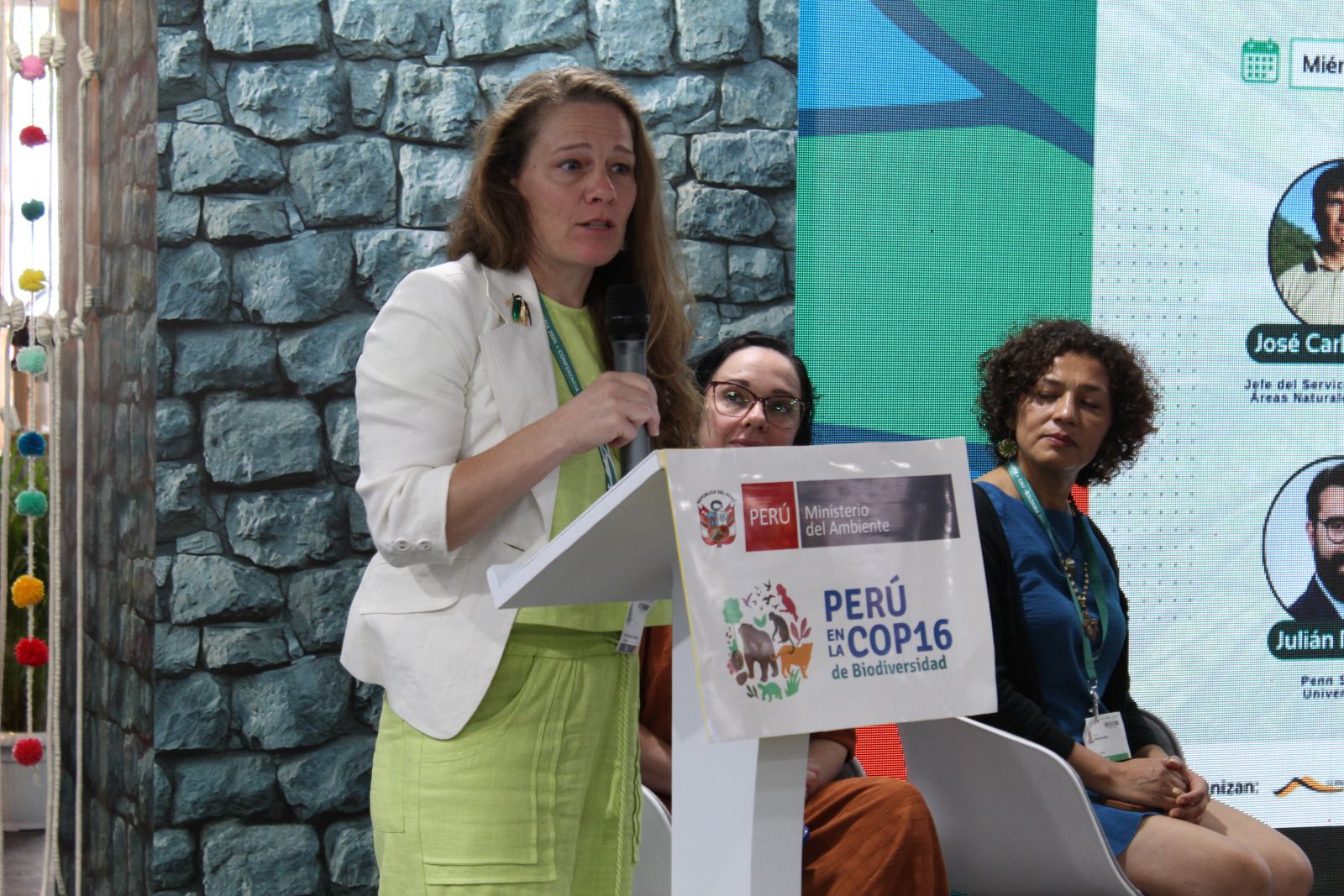
Environmental destruction, degradation and change negatively influence the health of individuals and communities and has become a significant factor in public and global health trends. Scientists are still learning how to calculate these outcomes and interpret them in terms of health costs and economic impact.
The management of ecosystems, land, and marine areas determine how and if the state of the environment is protected, conserved, restored, prioritized and valued. In that way, they determine how we promote health and prevent disease.
Next steps
A range of activities can support the implementation of the Global Action Plan at national and regional levels. The CBD will be looking for governments to raise awareness of biodiversity and health interlinkages and to support capacity building, convening of regional workshops, coordinating work with health-related ministries, and sharing guidance and best practices on integrated and transdisciplinary activities.
To learn more, read Implementing the Global Action Plan on Biodiversity and Health, which was recently published in The Lancet.
IAI Newsletter 4/24
Brazilian Project Bridges Science and Policy for Environmental Solutions
A pioneering initiative in Brazil is redefining how science and policy work together to tackle complex social and environmental challenges. The Biota Synthesis Nucleus, based in São Paulo, brings scientists, policymakers, and community stakeholders into collaborative working groups to co-develop solutions for issues such as climate change, biodiversity loss, and sustainable urban planning.
The project, supported by the São Paulo Research Foundation (FAPESP), has already contributed to key policies like São Paulo’s Climate Action Plan and the Refloresta-SP forest restoration program. Its innovative approach focuses on “transdisciplinary synthesis,” blending academic research with local and practical expertise to create actionable knowledge.
Flexible Solutions for Urgent Problems
The Biota Synthesis Nucleus operates through seven specialized working groups, each tackling a different area, from pollination services to climate finance. These groups adapt their methods to specific needs, using flexible formats such as frequent short meetings, hybrid collaborations, and immersive workshops. This adaptability allows the project to respond quickly to urgent policy demands while fostering long-term collaboration.
For example, when the São Paulo state government sought contributions to its Climate Action Plan, the team organized a three-month task force to deliver a high-impact proposal, demonstrating the project’s ability to balance urgency with scientific rigor.
Building Trust and Bridging Gaps
Central to the project’s success is its emphasis on two-way communication between scientists and policymakers. Moving beyond a traditional consultancy model, the initiative fosters co-creation, where stakeholders collectively identify problems and design solutions. Trust-building activities, such as regular meetings and transparent communication, ensure that all participants feel included and aligned.
“This project is not just about generating knowledge—it’s about creating trust and bridging different perspectives to make real-world change,” said Jean Paul Metzger, one of the project’s coordinators and former member of the IAI’s Scientific Advisory Committee.
A Model for the Future
Despite its achievements, the Biota Synthesis Nucleus has faced obstacles such as data access limitations and power imbalances among stakeholders. The project addresses these challenges through formal agreements, the incorporation of knowledge brokers to facilitate dialogue, and an emphasis on non-academic outputs such as technical notes and policy frameworks.
The success of Biota Synthesis highlights the potential of transdisciplinary approaches to address global challenges. Its methods are already being recognized as a model for integrating science and policy, offering hope for replicating similar initiatives worldwide. By focusing on collaboration, flexibility, and actionable outcomes, the project sets a new standard for tackling the world’s most pressing socio-ecological problems.
For more information, read Guiding transdisciplinary synthesis processes for social-ecological policy decisions, a white paper written by Carlos Joly, member of the IAI’s Science-Policy Advisory Committee, Jean Paul Metzger, and colleagues.
IAI Newsletter 4/24
Road to Belém: science and health at the center of climate action
Strategies for applying climate justice principles in public policy, innovations to address global challenges, and access to finance and equity in resources were some of the topics of discussion at the Second International Congress on Climate Change and Health Research, held October 21-23, 2024 in Mexico City.
This event brought together more than 700 participants from different sectors, including government representatives, academics, researchers, health and environmental leaders, students, and social organizations, both in person and virtually.
Among the impacts of climate change that participants considered most relevant were direct impacts, such as heat waves, droughts and storms, and indirect impacts, such as respiratory diseases, malnutrition and food insecurity. Mitigation and adaptation strategies in the health sector were explored, with emphasis on the co-benefits they can bring to public health. In addition, transdisciplinary approaches that integrate science, public policy and communities to move towards more comprehensive solutions were discussed.
Participants also held discussions on access to funding for climate research projects and the importance of ensuring that these resources drive evidence-based actions. Finally, the congress provided a space to reflect on climate justice, addressing equity in the distribution of climate change impacts and proposed solutions.
The results and conclusions of this forum highlight the urgency of facing climate challenges and lay the groundwork for generating concrete contributions for the Conference of the Parties (COP30), to be held in Belém do Pará, Brazil, in November 2025.
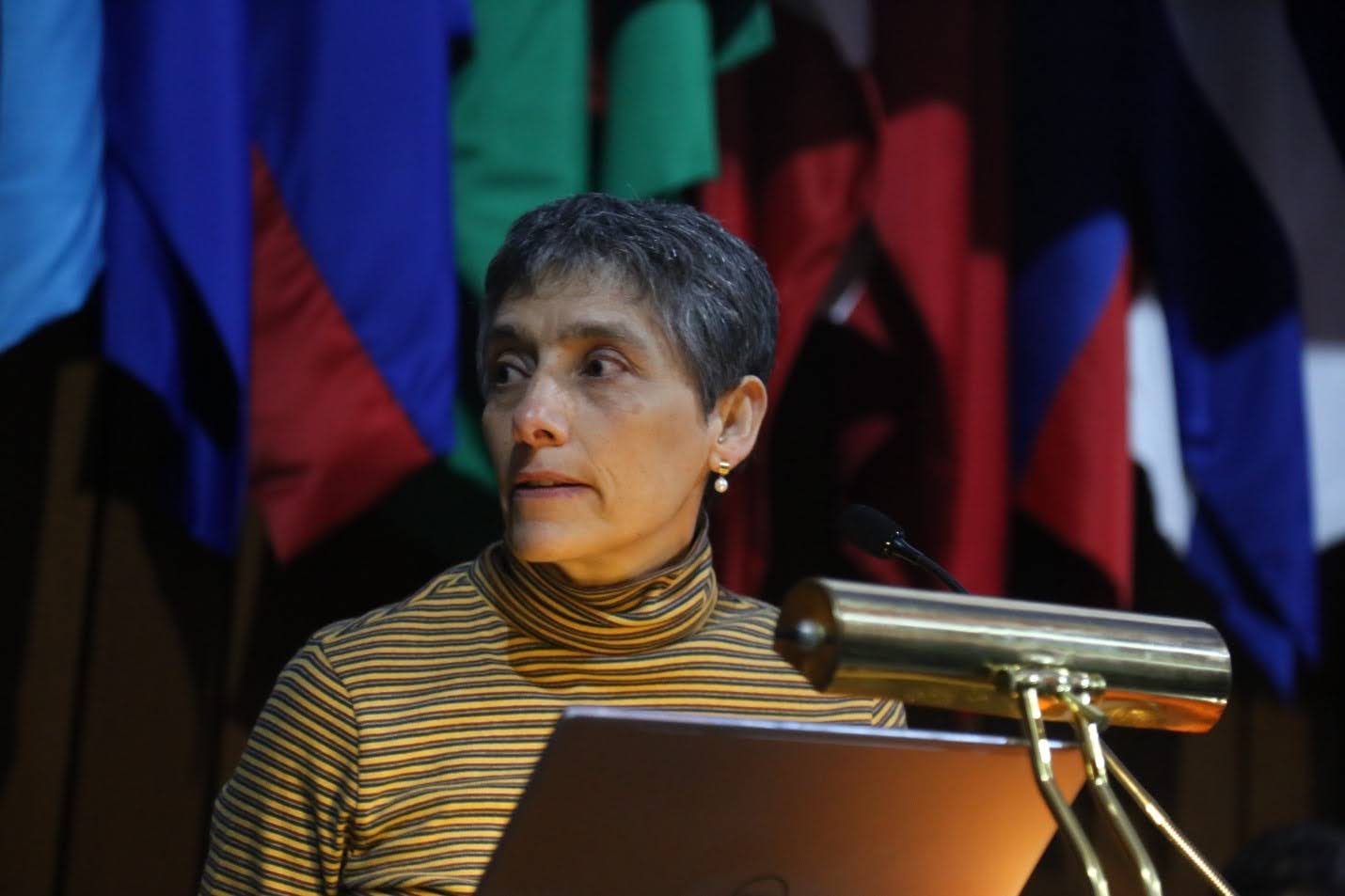 | 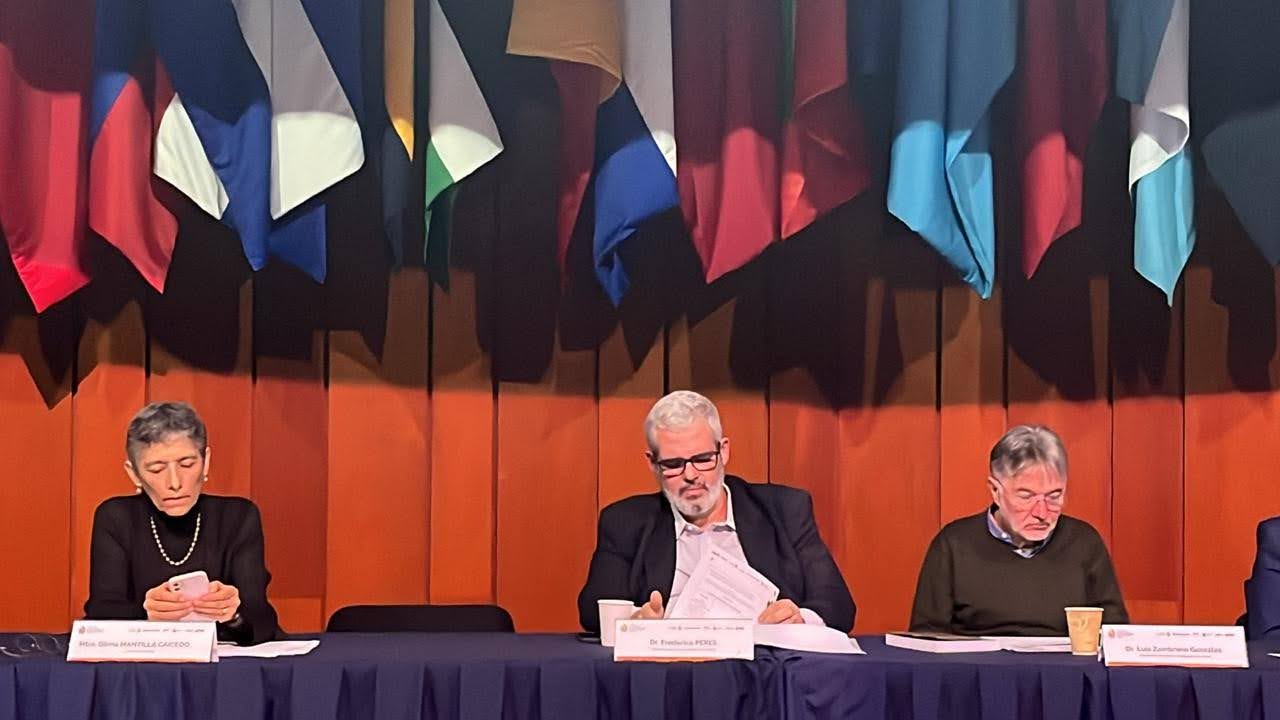 |
Among the contributions to the congress is the presentation by Gilma Mantilla, who represented the Inter-American Institute for Global Change Research (IAI) as a member of the Science and Policy Committee, who shared the institute’s experience in implementing a transdisciplinary approach to address the intersections between climate change, environment and health. Stella Hartinger Peña, co-director of the Latin American Center of Excellence on Climate Change and Health, presented the findings of The Lancet Countdown Latin America Report 2023. Daniel Buss, head of the PAHO/WHO Climate Change and Environmental Determinants of Health Unit, shared an analysis of the impacts of climate change on health in Latin America and the Caribbean. Elaine Flores Ramos highlighted how climate change disproportionately affects women and Horacio Riojas Rodriguez discussed the critical linkages between climate change, food security and occupational health.
This year, the IAI published the compendium Health, Climate and Environment in Latin America and the Caribbean, which compiles part of the research it funded through its seed funding program. The aim of the institute is to contribute to both science production and science-policy linkages in the region. To this end, the IAI Executive Directorate expects to articulate activities with its partners on the road to Belém and during COP30.





